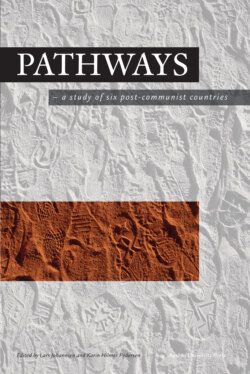Pathways

Реклама. ООО «ЛитРес», ИНН: 7719571260.
Оглавление
Группа авторов. Pathways
Preface
CHAPTER 1. After the Wall: Political development trajectories in selected post-communist countries
PERTINENT THEORY
THE QUADRUPLE OHALLENGE
Designing political institutions
Redistributing ownership
Dismantling or rebuilding the state
Who to include and who to exclude?
The international context
THE BEAUTY OF MAXIMISING VARIATION
References
CHAPTER 2. Co-optation and control: Managing heterogeneity in Kazakhstan
POLITICAL DEVELOPMENT: SEMI-AUTHORITARIANISM. AND ELITE FRAGMENTATION
STATE BUILDING: COMPARTMENTALISATION AND CORRUPTION
NATION BUILDING: MULTIETHNICITY AND SUB-ETHNICITY
ECONOMIC TRANSFORMATION
INTERNATIONA LIS ATI ON: LIBERALISATION. AND MULTI-VECTOR FOREIGN POLICY
CONCLUSIONS
References
CHAPTER 3. Shevardnadze’s political strategies: The rise and fall of the incumbent
SETTING THE SCENE
STABILISATION: THE FIRST THREE STEPS
Russia to the rescue
Outmanoeuvring the paramilitary groups
Rebuilding the economy
IN THE GREY ZONE: POWER STRATEGIES
Building the machine: co-opting and balancing
Staying tuned: the policy of kompromat
Feeding the machine: corruption and patron-client relations
‘Absurdity Fair’, where rules are made to be broken
THE WELL DRIES UP
The emergence of alternative elites
THE COLLAPSE AND THE ROSE REVOLUTION
References
CHAPTER 4. Understanding politics in Estonia: The limits of tutelary transition
TUTELARY TRANSITION
IMPERATIVES FOR TUTELARY TRANSITION
ECONOMIC REFORM AND SHOOK THERAPY
POLITICAL DEVELOPMENT
ELECTORAL COMPETITION
STATE BUILDING AND EUROPEAN UNION ACCESSION
MINORITY INTEGRATION AND NATION BUILDING
WILLING SUBJECTS?
CONCLUSION
References
CHAPTER 5. Understanding politics in Slovenia: Constitutional corporatism and politico-administrative relations
HISTORICAL LEGACIES AND THE DEMOCRATISATION PROCESS
CORPORATISM AND DIVISION OF POWER
THE MODERN ISATION PROCESSES OF THE. SLOVENIAN STATE ADMINISTRATION
SLOVENIAN POLITICO-ADMINISTRATIVE. RELATIONS: WHO HOLDS THE KEYS?
CONCLUSION
References
CHAPTER 6. Democracy or deficiency? Czech politics in the context of the consequences of its party system
THE FRAMEWORK FOR PARTY POLITICS
POLITICAL MALAISE?
CIVIL SOCIETY
FOREIGN POLICY AND INTERNATIONAL INFLUENCE
CONCLUSION
References
CHAPTER 7. Breaking with post-communism in Poland
PARTY STRUCTURES. Internal party leadership
Coalition leadership
STATE STRUCTURES. The position of the executive in parliament
Core executive
IMPACT OF EUROPEANISATION. Institutional misfit
EU pressures and domestic mobilisation
TOWARDS ENHANCED DEMOCRATIC GOVERNANCE?
References
CHAPTER 8. Keys to transition and. paths leading beyond
A POCKETFUL OF KEYS
Coping with heterogeneity: Kazakhstan
Flexible clientelism or ‘Absurdity Fair’: Georgia
The tutelary elite (or a ‘dual’ society): Estonia
Working corporatism – reinforced consensus: Slovenia
Contested consensus: The Czech Republic
Institutional reform as policy response: Poland
COMBINING ELITE KEYS TO UNDERSTANDING TRANSITIONS – CONSENSUS AND INCLUSIVENESS
References
Biographies
Отрывок из книги
Edited by Lars Johannsen & Karin Hilmer Pedersen
A STUDY OF SIX POST-COMMUNIST COUNTRIES
.....
Diamond, L. 2002. ‘Elections Without Democracy: Thinking about Hybrid Regimes’, Journal of Democracy, 13, 2, 21-35.
Eke, S.M. & T. Kuzio 2000. ‘Sultanism in Eastern Europe: The Socio-Political Roots of Authoritarian Populism in Belarus’, Europe-Asia Studies, 52, 3, 523-547.
.....